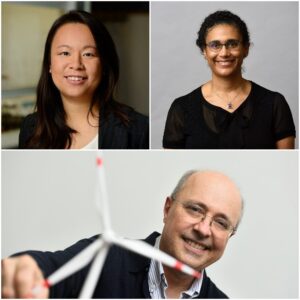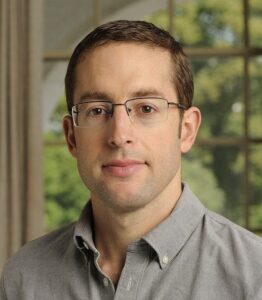The Johns Hopkins University’s Discovery Awards provide grant awards to cross-divisional teams, comprised of faculty and/or non-faculty members from at least two schools or affiliates of the university, who are poised to arrive at important discoveries or creative works. The expectation is that these awards will spark new, synergistic interactions between investigators across the institution and lead to work of the highest quality and impact.
Two Discovery Awards are being partially funded by the Ralph O’Connor Sustainable Energy Institute (ROSEI). See below for the titles, abstracts, and brief summaries for the projects.
Title: Developing Adsorptive Coatings and Regenerative Technologies for Simultaneous Atmospheric CO2 and Wind Power Harvesting

Sara Thoi (T-Left), Dennice Gayme (T-Right), and Charles Meneveau (Bottom)
Principal Investigators: Sara Thoi (ROSEI Leadership Council Member), Dennice Gayme (ROSEI Leadership Council Member) and Charles Meneveau (ROSEI Affiliated Researcher)
Summary: Removal of CO2 through Direct-Air Carbon Capture (DACC) provides a pathway for reducing energy related emissions. A major challenge to its implementation at the scale required to impact global atmospheric CO2 budgets is the significant amount of energy current technologies require to force large amounts of air across adsorbing material for mass transfer. We hypothesize that this limitation can be overcome by exploiting the large surface area (turbine blade) exposed to high relative velocity in an operating utility scale wind turbine, and its associated potential for significant rates of forced convective mass transfer for CO2 capture. This project proposes initial developments of the adsorptive materials, mass transport characterization, along with proof of concept and prototype testing of regenerative steps to realize this new and sustainable technology.
The project also involves collaboration with Portland State University in Oregon to conduct wind tunnel experiments.
Title: An Abiotic-Biotic Hybrid System for Integrated Carbon Capture and Mineralization

Yayuan Liu
Principal Investigators: Yayuan Liu (ROSEI Affiliated Researcher) and Xiongyi Huang (Arts & Sciences)
Summary: Industrial brine is an abundant alkalinity source that can be used for carbon dioxide sequestration into mineral carbonates. However, carbon capture and mineralization with brine is neither thermodynamically nor kinetically favorable. In this Discovery award collaboration (Yayuan Liu in ChemBE and Xiongyi Huang in Chemistry), the team aims to effectively address such challenges via an abiotic-biotic hybrid system combining metalloenzymes to accelerate carbon dioxide dissolution into brine and an electrochemical driving force to induce carbonate formation.
Catalyst Awards

Michael Levien
In addition to the Discovery Awards, JHU recently announced its Catalyst Awards recipients. These grant awards of up to $75,000 support the promising research and creative endeavors of early career faculty with the goal of launching them on a path to a sustainable and rewarding academic career. The program encompasses funding, mentoring opportunities, and the chance to join a cohort of peers at a similar stage in their career.
ROSEI is helping to fund the Catalyst Award for Sara Thoi, a member of the Leadership Council who is also an Assistant Professor in the Department of Chemistry. The institute is also funding a Catalyst Award for Michael Levien, an Associate Professor in the Department of Sociology. ROSEI affiliated researchers Michael Degani and Thomas Kempa also received Catalyst Awards.